In the world of skincare, the focus has primarily been on topical treatments such as creams, serums, and masks. While these products play a crucial role in maintaining skin health, the integration of oral supplements can provide an added layer of support from within. Pynocare, a scientifically formulated and clinically-approved oral supplement, offers a unique approach to skincare by addressing concerns at a systemic level. These melasma treatment capsules are formulated to target melasma from within – disrupting the processes that contribute to the development and exacerbation of melasma. In this article, we will explore the benefits of incorporating Pynocare into a skincare regimen and the synergistic effects it can have when used in conjunction with topical treatments.
Pynocare: A Holistic Approach to Melasma Management
Pynocare is a proprietary blend of natural ingredients, including Procyanidin (as French maritime pine bark extract), ascorbic acid (vitamin C), beta carotene (Vitamin A) (as D.Salina Extract), and d-alpha-Tocopheryl Acetate (Vitamin E). These ingredients work together to provide antioxidant protection and promote overall skin health. Studies have shown that the combination of these ingredients can help improve skin elasticity, reduce the appearance of wrinkles, and protect against UV-induced damage.
One of the key benefits of taking Pynocare orally is its ability to target skin concerns from the inside out. While topical treatments can address surface-level issues, such as dryness or acne, oral supplements like Pynocare can support skin health at a deeper level by providing essential nutrients and antioxidants that may be lacking in the diet. Let’s take a look at how each of the ingredients of this melasma treatment capsule works to target melasma from within.
- Procyanidin: Procyanidin is a type of flavonoid found in French maritime pine bark and other plant sources. Foods such as red wine, cocoa, and apple are also rich sources of procyanidin. It is widely known for its antioxidant properties and its ability to protect the skin from oxidative stress. Research has shown that antioxidants like procyanidin can help reduce melanin production and inhibit the activity of tyrosinase, an enzyme involved in the formation of skin pigmentation.
A study published in the journal Phytotherapy Research demonstrated that procyanidin-rich grape seed extract can effectively lighten hyperpigmented skin areas and improve overall skin tone. A more recent study in 2020 also showed that procyanidin-rich apple polyphenols have various skin health benefits including alleviating UV irradiation induced skin pigmentation.
- Vitamin A: Beta carotene, also known as vitamin Al, plays a significant role in addressing hyperpigmentation, including conditions like melasma. Vitamin A is essential for skin health and regeneration, as it promotes cell turnover, collagen production, and skin renewal processes. When taken orally, vitamin A can help improve hyperpigmentation by regulating melanin production and promoting the shedding of pigmented skin cells. By supporting the growth of new, healthy skin cells, oral vitamin A aids in fading dark spots and achieving a more even skin tone. Additionally, vitamin A’s ability to enhance skin texture and promote skin rejuvenation can contribute to reducing the appearance of pigmentation irregularities associated with melasma.
Research has shown that oral vitamin A supplementation can be beneficial in managing hyperpigmentation, including melasma. Studies have demonstrated the efficacy of vitamin A in inhibiting melanin synthesis and promoting skin turnover, leading to improvements in skin pigmentation and tone. By addressing the underlying mechanisms of hyperpigmentation from within, oral vitamin A offers a comprehensive approach to managing melasma and other pigmentation concerns. Incorporating vitamin A into a skincare regimen can help you achieve a clearer, more radiant complexion by targeting pigmentation at its source and supporting overall skin health and vitality.
- Vitamin C: Oral vitamin C, also known as ascorbic acid, offers a range of benefits in addressing hyperpigmentation, including conditions like melasma. Vitamin C is a potent antioxidant that helps brighten the skin, reduce hyperpigmentation, and protect against UV-induced damage. When taken orally, vitamin C can inhibit melanin production by interfering with the enzyme responsible for melanin synthesis. This can lead to a more even skin tone and a reduction in the appearance of dark spots associated with melasma. Additionally, vitamin C can improve skin texture and firmness, further contributing to a more uniform complexion.
Studies have shown that vitamin C’s antioxidant properties help protect the skin from oxidative stress, a key factor in the development of hyperpigmentation. By neutralizing free radicals and supporting skin repair processes, oral vitamin C can enhance skin clarity, reduce hyperpigmentation, and improve overall skin health. Incorporating vitamin C into a daily supplement regimen can provide comprehensive support for addressing pigmentation concerns, ultimately helping you achieve a brighter, more luminous complexion.
- Vitamin E: Oral vitamin E, another powerful antioxidant, offers several benefits in managing hyperpigmentation, including conditions like melasma. Vitamin E helps protect the skin from oxidative damage and inflammation, which are key factors in the development of hyperpigmentation. By neutralizing free radicals and supporting skin repair processes, oral vitamin E can help reduce hyperpigmentation, improve skin texture, and enhance overall skin health. Vitamin E also works synergistically with other antioxidants to enhance their efficacy in addressing pigmentation concerns, making it a valuable addition to a comprehensive skincare regimen.
The efficacy of oral vitamin E in managing hyperpigmentation and melasma have been widely documented in literature. Studies have shown that vitamin E can reduce oxidative stress, inhibit melanin production, and improve skin tone. By addressing the underlying mechanisms of hyperpigmentation from within, oral vitamin E can help you achieve a more even complexion and reduce the appearance of dark spots associated with melasma. Incorporating vitamin E into a daily supplement routine can provide valuable support for skin health and pigmentation management, ultimately contributing to a brighter, more radiant skin tone.
The combination of Procyanidin, Vitamin A, Vitamin C, and Vitamin E in Pynocare offers a synergistic approach to targeting melasma by addressing multiple pathways involved in pigmentation and skin health. These ingredients work together to inhibit melanin production, promote skin cell turnover, and protect against oxidative damage, ultimately leading to a brighter and more even complexion. Incorporating Pynocare into a comprehensive skincare regimen can help you effectively manage melasma and achieve healthier, more radiant skin.
The Synergy of Oral and Topical Treatments
While topical treatments are essential for targeting specific skin concerns, they may not always address underlying issues that contribute to skin aging and damage. By incorporating Pynocare into a skincare regimen, you can enhance the effectiveness of their topical treatments and achieve more comprehensive results.
Combining topical treatments with oral supplements like Pynocare can offer a comprehensive approach to managing melasma. Topical treatments for melasma typically include ingredients that target pigmentation, promote skin renewal, and provide antioxidant protection. Some possible topical treatments that can be used in conjunction with oral Pynocare include:
- Hydroquinone: Hydroquinone is a common ingredient used in topical treatments for melasma. It works by inhibiting melanin production in the skin, helping to lighten dark spots and even out skin tone. When used alongside oral Pynocare, hydroquinone can enhance the lightening effects on hyperpigmented areas.
- Retinoids: Topical retinoids, derived from Vitamin A, promote cell turnover and skin renewal, which can help fade dark spots and improve skin texture. Combining retinoid creams or serums with oral Pynocare can support the overall effectiveness of the treatment by targeting pigmentation at both the surface and deeper levels of the skin.
- Vitamin C serums: Topical Vitamin C serums are known for their brightening and antioxidant properties. Vitamin C can help reduce hyperpigmentation, protect the skin from environmental damage, and promote collagen synthesis. Using a Vitamin C serum in combination with oral Pynocare can provide added antioxidant support and enhance the skin-brightening effects.
- Sunscreen: Sun protection is crucial in managing melasma, as UV exposure can trigger and worsen pigmentation issues. Applying a broad-spectrum sunscreen with high SPF daily is essential to protect the skin from UV damage. Using sunscreen alongside oral Pynocare can help prevent further pigmentation and maintain the results of the treatment.
Consulting a dermatologist is essential when incorporating Pynocare and topical treatments for melasma into a skincare routine. They can accurately diagnose melasma, identify underlying causes, and tailor treatment plans to individual needs. Their expertise allows for the optimization of treatment approaches, ensuring the safe and effective use of topical products and oral supplements like Pynocare. By consulting a dermatologist, you can receive personalized guidance on selecting the most suitable treatments, combining products for synergistic effects, and monitoring skin response for optimal outcomes.
Regular monitoring and follow-up with your dermatologist are also crucial for tracking treatment progress, assessing skin response, and making necessary adjustments to achieve desired results. They can provide ongoing support, guidance on skincare routines, and recommendations for sun protection practices to maintain long-term skin health and prevent melasma recurrence. With the expertise of a dermatologist, you can navigate the complexities of melasma treatment, optimize the use of Pynocare and topical treatments, and achieve a clearer, more even complexion.
Conclusion
Incorporating melasma treatment capsules into a skincare regimen can offer a holistic approach to skin health by providing essential nutrients and antioxidants that support overall skin function. By combining oral supplements with topical treatments, you can address skin concerns from multiple angles and achieve more comprehensive results. As research continues to highlight the synergistic effects of oral and topical skin care interventions, the integration of products like Pynocare may become increasingly important in promoting healthy, radiant skin.
Disclaimer: The information presented in this article is based on peer-reviewed research and reputable sources. However, it is intended for informational purposes only and should not be considered a substitute for professional medical advice, diagnosis, or treatment. Individuals with specific skin concerns, such as melasma, are encouraged to consult with a qualified dermatologist or healthcare provider for personalized recommendations and treatment plans tailored to their unique needs. Medical experts can provide individualized guidance, monitor treatment progress, and address any underlying health conditions that may impact skincare outcomes. It is important to seek professional medical advice before making any significant changes to skincare routines or starting new treatments.
References
Bagchi, D., Swaroop, A., Preuss, H. G., & Bagchi, M. (2014). Free radical scavenging, antioxidant and cancer chemoprevention by grape seed proanthocyanidin: an overview. Mutation Research, 768, 69–73. https://doi.org/10.1016/j.mrfmmm.2014.04.004
Neagu, N., Conforti, C., Agozzino, M., Marangi, G. F., Morariu, S. H., Pellacani, G., Persichetti, P., Piccolo, D., Segreto, F., Zalaudek, I., & Dianzani, C. (2022). Melasma treatment: a systematic review. The Journal of Dermatological Treatment, 33(4), 1816–1837. https://doi.org/10.1080/09546634.2021.1914313
Shoji, T., Masumoto, S., Moriichi, N., Ohtake, Y., & Kanda, T. (2020). Administration of Apple polyphenol supplements for skin conditions in healthy women: a randomized, Double-Blind, Placebo-Controlled clinical trial. Nutrients, 12(4), 1071. https://doi.org/10.3390/nu12041071
Yamakoshi, J., Sano, A., Tokutake, S., Saito, M., Kikuchi, M., Kubota, Y., Kawachi, Y., & Otsuka, F. (2004). Oral intake of proanthocyanidin-rich extract from grape seeds improves chloasma. Phytotherapy Research, 18(11), 895–899. https://doi.org/10.1002/ptr.1537
PYNOCARE (Procyanidin + Ascorbic Acid + Betacarotene + d-Alpha-Tocopheryl Acetate)
The first and only oral medicine that is clinically proven to reduce Melasma or dark spots formation in as early as 8 weeks. Unlike creams, lotions, and gels, it has MSCC or Melasma Skin Clear Complexion Complex formulation that deeply penetrates the inner layers of the skin, to help normalize melanin levels, thus minimizing the appearance of dark spots in a short time.
Mega Lifesciences Limited Inc. or Mega We Care, is actively involved in helping millions of people have access to safe, effective, world-class quality nutritional & herbal supplements, OTC, and ethical products.

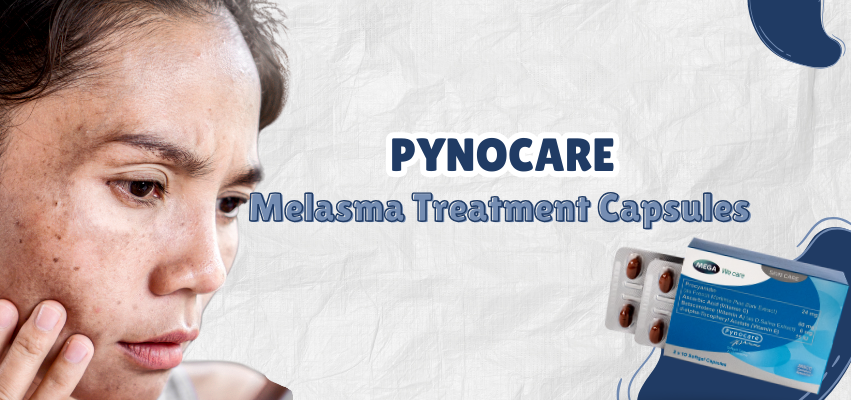
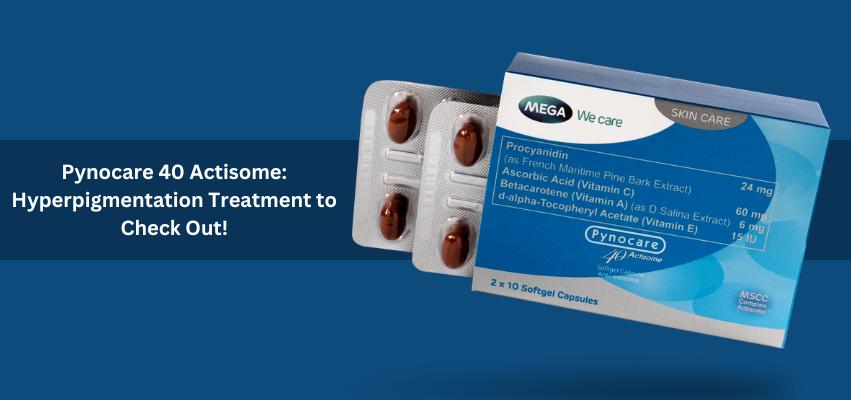
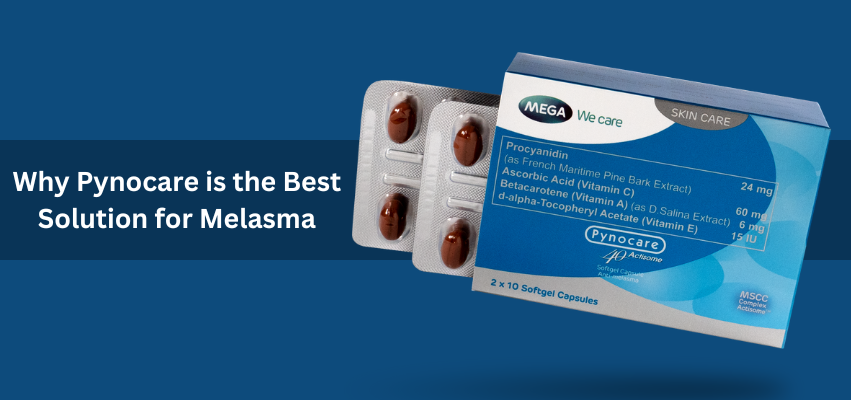
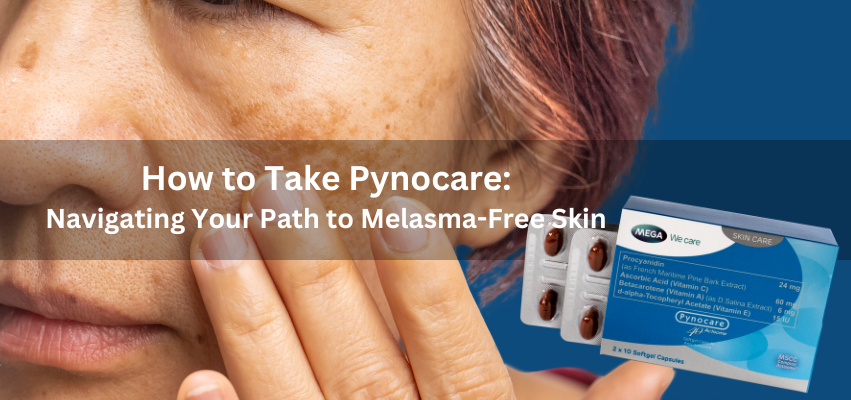


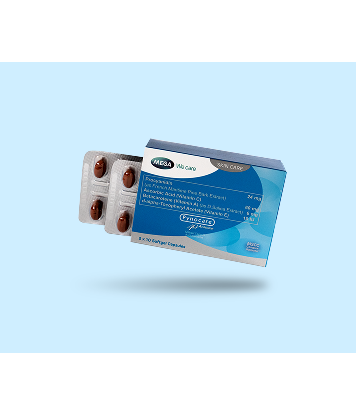


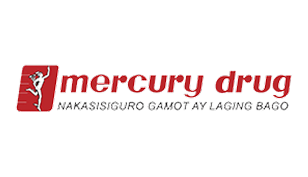








No Comments on Pynocare: Melasma Treatment Capsules that You Should Know About